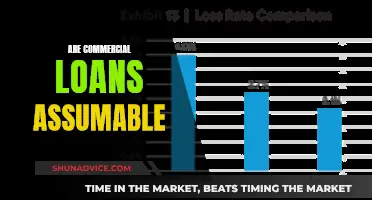
Jumbo loans are a type of mortgage designed to help finance the purchase of high-end homes or properties located in expensive housing markets. In Arizona, the current conforming loan limit for 2025 is <$806,500, so a loan amount exceeding this will be considered a jumbo loan. Jumbo loans typically have stricter requirements than other types of mortgages, with borrowers needing a higher credit score, a larger down payment, and a lower debt-to-income ratio to qualify. These loans are also known as non-conforming loans and are not guaranteed by Fannie Mae or Freddie Mac.
| Characteristics | Values |
|---|---|
| Jumbo loan limit in Arizona | $766,550 - $806,500 across all counties |
| Jumbo loan interest rates | Higher than those on regular, conforming mortgages |
| Down payment | 3% - 20% minimum |
| Credit score | 660 - 740 minimum |
| Debt-to-income ratio | Below 43%, ideally closer to 36% or lower |
| Cash reserves | 6-24 months of mortgage payments and expenses |
What You'll Learn

Jumbo loans are for properties valued over $806,500
Jumbo loans are a type of mortgage designed for borrowers seeking to finance the purchase of a home that exceeds the limits set by the Federal Housing Finance Agency (FHFA). Jumbo loans are also known as non-conforming loans because they surpass the conventional loan limits established by Fannie Mae or Freddie Mac. In Arizona, the current conforming loan limit for 2025 is $806,500, so any loan amount exceeding this threshold is considered a jumbo loan.
Jumbo loans are typically sought by individuals looking to purchase high-end homes or properties located in expensive housing markets, such as Scottsdale in Arizona. These loans provide the necessary financing to acquire luxury or larger properties that exceed the limits of standard mortgages. Jumbo loans offer both fixed-rate and adjustable-rate options, catering to borrowers' preferences and financial situations.
Qualifying for a jumbo loan in Arizona comes with stricter requirements compared to conforming loans. Borrowers generally need to meet higher credit score thresholds, often exceeding 700, and demonstrate a substantial stable income. Lenders also assess the borrower's debt-to-income ratio, aiming for a ratio below 43% and preferably closer to 36% or lower. This ratio indicates the borrower's ability to manage their debt load while taking on additional mortgage payments.
Additionally, jumbo loans usually require larger down payments, ranging from 10% to 20% or more. The specific down payment requirement depends on the lender and the borrower's financial circumstances. Jumbo loans also necessitate sufficient liquid assets or savings to cover a certain number of months' worth of loan payments, typically between six and twenty-four months.
It's important to note that jumbo loans are considered riskier for lenders, which results in higher interest rates compared to conforming loans. The interest rates on jumbo loans are typically higher due to the larger overall loan amount. However, it's worth consulting multiple lenders as jumbo loan guidelines can vary, and one lender might offer more favourable terms than another.
Grace Loan Advance: Understanding This Unique Financial Offering
You may want to see also

They are also known as non-conforming loans
Jumbo loans are also known as non-conforming loans because they exceed the conventional loan limits set by the Federal Housing Finance Agency (FHFA) for Fannie Mae or Freddie Mac. In other words, they are not guaranteed by Fannie Mae or Freddie Mac.
The FHFA sets the conforming loan limit, which is the maximum loan amount that Fannie Mae and Freddie Mac are allowed to buy. In most parts of the US, the conforming loan limit for 2025 is $806,500. Any loan amount above this threshold is considered a jumbo loan. However, it's important to note that the conforming loan limit can vary from year to year and is subject to change based on home price fluctuations.
Jumbo loans are typically used for purchasing high-end homes or properties located in expensive housing markets. They are designed to help buyers finance the purchase of homes that exceed the conventional loan limits. In Arizona, for example, the conforming loan limit for 2025 is $806,500, so a loan amount exceeding this value would be considered a jumbo loan.
Jumbo loans are considered riskier for lenders, and as a result, they come with stricter requirements than conforming loans. Borrowers typically need a higher credit score, a larger down payment, and a lower debt-to-income ratio to qualify for a jumbo loan. The down payment requirements for jumbo loans can be as high as 20% or more, but some lenders may offer jumbo loans with down payments as low as 5% to 10% for qualified buyers.
Military Loan Forgiveness: College Dreams, Reality?
You may want to see also

Qualifying for a jumbo loan is more complicated
Qualifying for a jumbo loan in Arizona is more complicated than a conventional loan. This is because jumbo loans are considered riskier for lenders, and they have stricter requirements.
Firstly, borrowers need a higher credit score to qualify for a jumbo loan. While the minimum credit score required is typically 700, some lenders may accept a score as low as 660. However, a score below this will likely disqualify you from getting a jumbo loan.
Secondly, jumbo loans require a larger down payment than traditional mortgages. While the exact amount varies depending on the lender and the borrower's financial situation, down payment requirements can be as high as 20% or more. Some lenders may offer jumbo loans with down payments as low as 10% if the borrower meets certain income and credit score requirements.
Thirdly, borrowers must have a low debt-to-income ratio (DTI) to qualify for a jumbo loan. Lenders typically look for a DTI below 43%, but a ratio closer to 36% or lower is ideal. A low DTI demonstrates the borrower's ability to manage their debt and make timely payments on their jumbo loan.
Additionally, during the asset review process, lenders will request that borrowers provide evidence of sufficient liquid assets or savings to cover at least six months' to one year's worth of loan payments. This requirement ensures that borrowers have the financial stability to manage their loan payments.
Finally, borrowers should be prepared to pay a higher interest rate for a jumbo loan. The interest rates on jumbo loans are typically higher than those on regular, conforming mortgages due to the increased risk for the lender.
Loan Asset Classification and Its Impact on Medicaid Eligibility
You may want to see also

Jumbo loans require a higher credit score
In Arizona, a jumbo loan is a type of mortgage used for homes and properties where financing exceeds the conventional loan limit of \$806,500. This limit is determined by the Federal Housing Finance Agency (FHFA) and changes annually. Jumbo loans are also known as non-conforming loans as they are not guaranteed by Fannie Mae or Freddie Mac.
Jumbo loans are often sought by individuals looking to purchase luxury or larger, more expensive properties. These loans have stricter requirements than conventional mortgages, and a higher minimum credit score is one of the key differences. While the exact credit score required will depend on the lender and loan terms, it is generally agreed that a higher credit score is necessary for a jumbo loan compared to a conventional or government-backed loan.
Lenders use your credit score to assess your financial reliability and responsibility. A higher credit score indicates a lower level of risk for the lender. When applying for a jumbo loan, your credit report will be scrutinised for any negative items, such as missed or late payments, foreclosures, or bankruptcies. These items can impact your eligibility for a jumbo loan, and you may be asked to explain any derogatory events. Therefore, it is advisable to build and maintain a good credit score when considering a jumbo loan.
The specific credit score requirements vary among lenders. For example, a Jumbo Smart loan from Rocket Mortgage requires a minimum median FICO® Score of 680 for primary residences, vacation homes, and investment properties. In contrast, their Jumbo Smart ARM product has a minimum credit score requirement of 740. Similarly, the VA offers jumbo loans to qualifying service members with a median FICO® Score of 640 or higher for loans up to \$1.5 million. This limit increases to \$2.5 million with a median score of 680 or better.
Additionally, jumbo loans often require a lower debt-to-income (DTI) ratio compared to conventional loans. Lenders calculate your DTI by dividing your required monthly debt payments by your gross monthly income before taxes. A low DTI ratio demonstrates your ability to manage your payments and is an important factor in securing a jumbo loan.
Steps to Become a Loan Signing Agent
You may want to see also

Jumbo loans are considered riskier for lenders
A jumbo loan is a type of home mortgage that exceeds the lending limits set by the Federal Housing Finance Agency (FHFA) for conventional mortgages. In Arizona, the current conforming loan limit for 2025 is $806,500, so for amounts larger than this, loans are referred to as "jumbo" mortgages.
Jumbo loans have stricter requirements than other types of mortgages. They have more stringent underwriting requirements, and borrowers must meet more rigorous credit requirements than those who apply for a conventional loan. A higher minimum credit score is required, and a larger down payment is expected, with a lower debt-to-income ratio. Lenders may ask for 6 to 24 months of mortgage payments and expenses on hand as reserves.
The qualification standards for jumbo loans are slightly tighter, and while they vary between lenders, they generally require a larger down payment than conforming loans. While the down payment restrictions have improved, and minimum down payments can start at 3%, it is common for lenders to require 20% down on jumbo loans for single-family units. Some lenders may even require up to 25% or 30%. A lower debt-to-income ratio is also required, proving the borrower's ability to manage their payments.
The Benefits of Yendo Title Loans Explained
You may want to see also
Frequently asked questions
A jumbo loan is a type of mortgage that’s designed to help finance the purchase of a home that exceeds the conventional loan limits set by the Federal Housing Finance Agency (FHFA) for Fannie Mae or Freddie Mac. In Arizona, the conforming loan limit for 2025 is \$806,500, so a loan amount exceeding this will be considered a jumbo loan.
Jumbo loans have stricter requirements than other types of mortgages. To qualify for a jumbo loan in Arizona, you will need a higher credit score, a low debt-to-income ratio, and a larger down payment. You will also need to show evidence of sufficient liquid assets or savings to cover the equivalent of 6-12 months' worth of loan payments.
Jumbo loans generally have higher interest rates compared to loans at or below the conforming loan limit. As of January 13, 2025, the 30-year fixed jumbo rate was 7.16%, while the traditional 30-year fixed loan rate was 7.06%.







